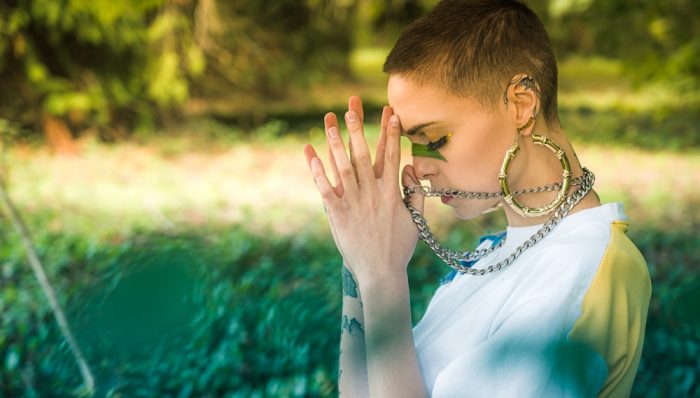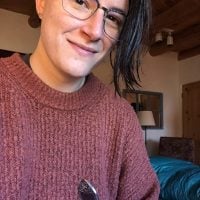I recently took part in an experiential training whose simple mission was to help us connect deeper and more authentically with others in the course and in the world.
I was all in from the get-go—this is my stuff, right here.
But, I was sorely disappointed when on the second weekend, I learned that differences in race, gender, and other aspects of identity were not going to be addressed or explored at all in the curriculum.
Though I’m not sure those topics uniformly need to be addressed in every self-help talk or training, I was shocked that it was not going to be covered at all in a training whose express purpose was to welcome all things, all emotions, and all people for the sake of true connection.
Why were people’s experiences with race, gender, and other intersections any different and not explicitly welcomed like everything else?
When in the context of a group discussion (about making the implicit social rules explicit for the sake of communication), I voiced how much those social issues and intersections affect how we all connect—or don’t connect—with one another. I was met with silence and what seemed to be slight skepticism on the part of the group.
On my end, race, gender, sexuality, ability, age, status, and other aspects of identity are all implicitly impacting our impressions and connections in the world—and, more to the point, within this class.
So why did it seem like I was the first person to bring up these topics to the facilitator? And why did it seem to fall on semi-deaf ears?
In response to my inquiry, the (white, male) facilitator basically said, “I hear you, and I hear this is important to you. A person can bring it into the group if it’s present for them, but otherwise it’s not included in the program. Let’s move on for now.”
This, frankly, grinded my gears. Why should the onus of bringing up issues related to identity always be on the people who are so often oppressed by them? In asking them to do so, one is asking them to “other” themselves—to be the one in the group to “disrupt” everything; change the topic; out themselves; and suddenly make things about race, gender, sexuality, and so on—when doing so by marginalized groups is so often frowned upon by those with more privilege. It puts the people in oppressed groups in the position of “educator”—and, really, spectacle—especially when they are a minority in said group.
Frankly, it’s not fair. Why can’t it be expressly invited and appropriately addressed by people in power and privilege? Why is the responsibility to fix things and break the silence so often on the shoulders of people of oppressed groups?
In expecting this, the facilitator was inadvertently reinforcing a system that silences these voices altogether, dismissing and erasing these crucial aspects of their diverse identities and experiences.
Maybe I was naive coming into this program to expect better. I’ve been in the self-help space as a participant and practitioner for the past seven years, and I’ve seen some pretty blatant f*ckups and well-meaning but utterly inappropriate conversations around these topics in “woke” spaces.
But it’s 2020, man. I figured that this international, progressive self-improvement organization might have its stuff at least a little together around these issues. I mean, if they’re not doing that work within the realm of connection and authentic expression, then what the heck are they doing? Excluding and oppressing by omission, that’s what.
Despite my social justice muscle flexing and some bottled rage simmering beneath the surface, I began to doubt myself and my instincts around this exchange. Was I making too big a deal of this? Should I not have mentioned it at all, even though it impacts my interactions with people of different identities within the class? Though I thought I presented it in a curious, non-accusatory way, was I overreacting or projecting my experience onto others?
We’ve all been taught that righteousness, even when deserved, is not a good look, and I wanted to check myself.
However, I stopped questioning myself so much when a few moments later, I received a Zoom DM from one of my fellow participants, the only person of color in our class. He expressed gratitude to me for speaking up and stated that he felt that race, gender, age, and nationality were underlying his experiences within the course as well. He demonstrated this perfectly when, coincidentally, he and I were paired up right after this text to do a connection exercise.
Soon after entering the Zoom room, he expressed that he was feeling impacted by our apparent age gap and gender difference. He, being an older male, and I, being a younger female, there was certainly an apparent, but implicit, power dynamic at play.
The goal for this break-out group was to connect on a deeper level, and truthfully, given this dynamic, I was initially a little hesitant and guarded. It is often hard to know what a man’s intentions are for wanting to connect. So often there is a hidden agenda, one that often feels uncomfortable, intrusive, and puts me on the defense.
In the back of my head is always some version of the following questions: Is he trying to hit on me, even if he doesn’t seem like it? Is he assessing my worth or desirability? Am I on display or exposed? Am I somehow “leading him on”? And behind all of these questions is a low-grade hum of possible threat to my safety, dignity, and full personhood. There is a certain guardedness that comes with the female experience that has been well-taught and almost constantly reinforced. And it makes connection and vulnerability with a man I don’t yet know exceptionally hard, or nearly impossible—at least for me.
So when this man, of his own volition, expressed a true desire to connect with me, person to person—naming the power differential, naming that he felt awkward asking for that connection, and realizing I may feel guarded for the reasons stated above—I felt entirely disarmed and at ease. Like my armor had no use, and I was suddenly free to set it down and relate. The implicit had been made explicit, and I felt relieved.
No man had ever explicitly acknowledged that experience of mine with compassion, and with no ulterior motive that I could detect. Simply a desire to connect with me as a person. In those moments of connection, I felt an unarmed kinship and trust with a man for the first time…maybe ever.
I was thrilled! The guidelines of this program had worked, though by using it to address power and privilege within our duo, we took it off the rails a bit. And though, in our short time, we were unable to address the other differences in power and privilege at play in our dynamic, it showed me what might be possible.
Making the implicit explicit as instructed helped us be real and make our own rules. It inspired connection, honesty, and humility.
But for us to be the only pair using these skills to discuss differences in power and privilege, to me, was a sadness. Furthermore, it undermined this organization’s mission of connection. The framework and the content of the course can be beneficial on some level—but if we never use it to connect with people of different identities and statuses, how can we fully see and feel safe with one another? If these topics go unsaid, then by default they seem unwelcome. Acknowledging these distinctions just might be the doorway to connection.
Don’t get me wrong, addressing issues of race, gender, sexuality, and other identities is a delicate dance. When done wrong, it can demolish a group’s connection and undermine the integrity of an organization, within the matter of a few decisive and divisive minutes. This is why simply trying is really not enough.
Harm is done in leaders “trying” without context and thorough education, regardless of intention. Well-meaning attempts at inclusion can have the opposite effects—polarizing, offending, and reinforcing oppressive systems. I’ve seen it.
Unless an organization is trained from the bottom up to understand and work against systemic oppression, then really more harm than good can come of these interventions in my experience.
Education on equity, diversity, and inclusion is not a box to be checked by HR. It’s a lived experience of ongoing realization and self-examination. These conversations should not be attempted in groups until facilitators are thoroughly prepared to make all people feel safe and seen—not just those who look like them or reside in the group with the most privilege. It takes a lot of ongoing work.
This organization, it seemed, was just not there yet. In researching the organization, I saw that all but maybe 3 of the 25 staff listed on their website were white (or white-passing). I felt like I was getting a glimpse into the potential problem here: perhaps they didn’t know that there was, in fact, a problem. They were just another self-improvement group spreading their wisdom, as well as their ignorance around these issues.
And maybe it’s not my job to fix it. Maybe I should accept that they are where they are and realize the relative fruitlessness of trying to incite possible institutional change. I’m not an expert—who am I to educate people on systems of oppression? Someone who, despite embodying several of these intersecting identities, still has a lot of privilege—that’s who. But, when presented with the possibility, why not use that privilege to create a more genuine and egalitarian “safe space” for all—not just for the dominant group?
I have opinions and insights, based in my experience and my education, but that’s about it. But maybe when it comes to speaking up, it’s better to try than to not—even if what I say is not perfect. Even if they don’t hear me. Even if I face ridicule or a change in status or acceptance.
These relatively minor risks are nothing compared to what people in far more oppressed groups face every day just by existing. It is my responsibility to help dismantle systems of oppression, as a person with more power and privilege. And in this case, that means letting some people in charge know that this is f*cked up and suggesting tangible changes, including hiring a consultant and polling past participants and staff about their experience with identity, inclusion, and oppression in these courses.
Even if I am never done doing the work, I can still do the work.
I have a meeting with the founder of this organization later this week—maybe I’ll send them this essay too.











Read 0 comments and reply